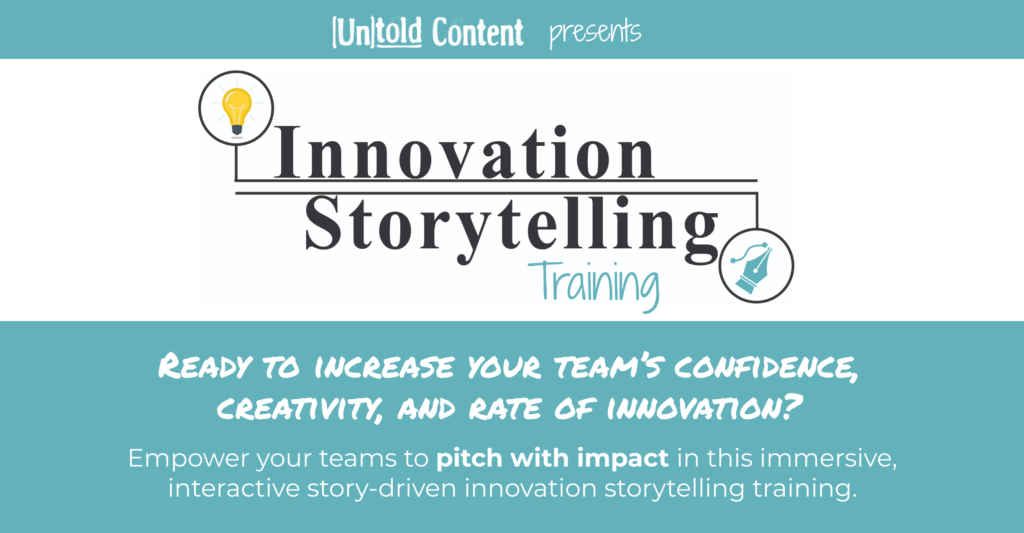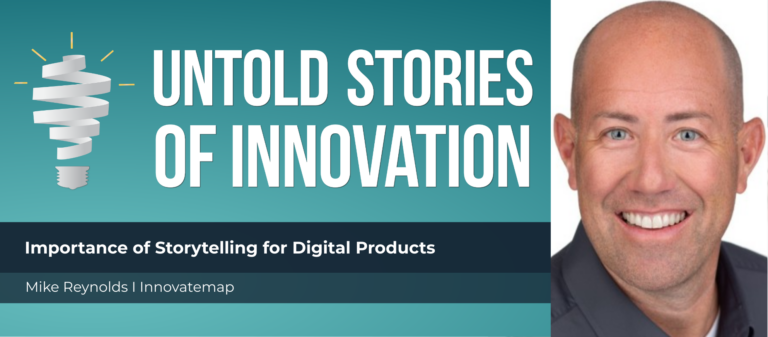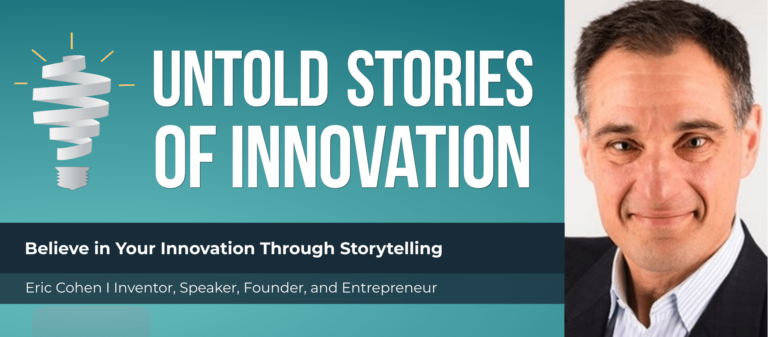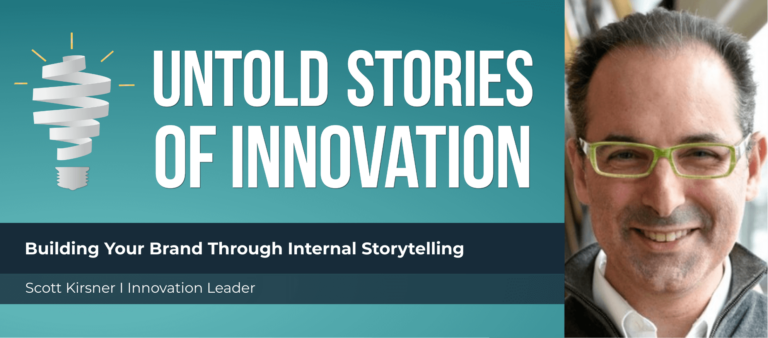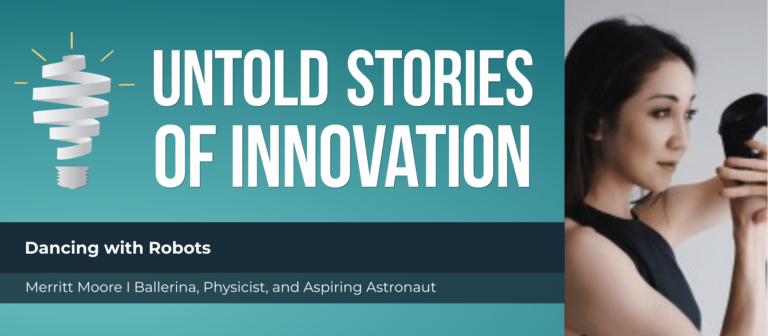Thriving in a Digital Age with Temi and Busayo Odunlami of Billion Strong
Untold Stories of Innovation
"Everybody and everything is moving towards a more virtual platform. We want to make sure that people who don't have access to technology, have access to resources that will propel them.” -Temi Odunlami, Billion Strong
From today’s episode Thriving in a Digital Age you’ll learn:
Why do stories matter to the innovation process? What values can be instilled in innovators who share stories? How do innovation leaders inspire creators to tell and share their success and failure stories?
We speak with Temi and Busayo Odunlami regarding their non-profit work with Billion Strong, an organization that seeks to empower people through a three-pronged approach encompassing digital expertise, business expertise, and social expertise. To them, feelings of fear and discomfort often occur just before one reaches the threshold of fantastic opportunity, and should be embraced. Temi and Busayo Odunlami empower people to become changemakers by focusing on empathy, care, and equity in tech.

Temi Odunlami is an educator, economist, data analyst, and project manager. As a director of Billion Strong, Temi wants to inspire and uplift young individuals, across the globe, to build future products and services while creating new jobs and new businesses that serve their communities and society. She believes that the framework supports the transformation required for individuals to develop the entrepreneurial spirit required to exist in a technology-driven world.
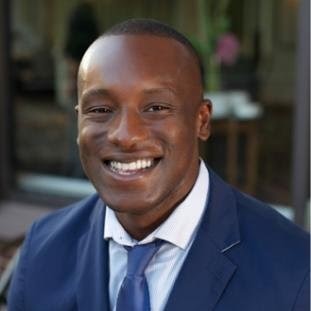
Busayo Odunlami works as a Senior at Ernst & Young Global Consulting Services, as well as a director of Billion Strong. Busayo and the team at Billion Strong believe that to achieve economic independence, there are a billion energetic, determined individuals that, if given a chance, will eagerly acquire the digital, social, and business skills necessary to succeed in today's ever-changing global environment, and Billion Strong seeks to provide those chances for acquisition.
untoldcontent.com/trainings/innovation-storytelling-training
TRANSCRIPT
This episode, Thriving in a Digital Age is powered by Untold Content’s innovation storytelling training. Increase buy in for your best ideas in this immersive and interactive, story-driven experience. Where your teams refine storytelling techniques for their latest projects, prototypes and pitches—and get inspired by 25 epic examples of impactful innovation stories. Learn more at https://untoldcontent.com/innovationstorytellingtraining-2/.
Katie Trauth Taylor: [00:00:04] Welcome to Untold Stories of Innovation, where we amplify untold stories of insight, impact and innovation. Powered by Untold Content. I’m your host, Katie Trauth Taylor.
Katie Trauth Taylor: [00:00:19] Our guests today are Temi and Busayo Odunlami. They are both co-founders of the Billion Strong Foundation. Temi is a project manager at an ED tech company, and Busayo is a manager at a big four consulting company. Thank you both so much for being on the podcast to talk more about Billion Strong Foundation and all of the innovation work that you’re doing.
Temi Odunlami: [00:00:41] Thank you so much for having us, Katie.
Busayo Odunlami: [00:00:43] Thank you for having us.
Katie Trauth Taylor: [00:00:44] So tell us more about Billion Strong Foundation and what it is that your mission is.
Temi Odunlami: [00:00:51] Well, our mission is to equip a billion young people with digital, social and business skills in a time like this where things are changing so rapidly and everybody and everything is moving towards a more virtual platform. We want to make sure that people who have access to these things are using them appropriately to further themselves. And people who don’t have access to technology and to computers and smartphones also have access to resources that will propel them and give them education.
Katie Trauth Taylor: [00:01:23] It’s so incredibly important, especially right now. I feel like there’s such an increased urgency for technological skills in the midst of all these challenges and the ways that we have to connect without really being together.
Temi Odunlami: [00:01:36] Yes.
Busayo Odunlami: [00:01:37] Definitely.
Katie Trauth Taylor: [00:01:38] Yes. So what are your personal stories of innovation? What led you to this moment to create Billion Strong?
Busayo Odunlami: [00:01:45] That’s a good question. So I think, you know, for me, the Billion Strong Foundation started about 13 years ago while I was a teacher’s college, Columbia University graduate student living in Harlem, New York. The university was expanding our campus further into Harlem, and naturally the real estate market was adjusting, so rents and property values were on the rise. So myself and a journalism school graduate student had sort of noticed that some of the businesses could survive this change if they just came online and at the time that meant having a logo, having a website, maybe creating a Twitter profile. Obviously, today, that would be unheard of. But the… Unfortunately, the market was really swift and over half of our clients were out of business. So that was sort of this is exposure for me as there needs to be an easier way to upscale, in general. Later in my career, the opportunity to work at the World Bank as a junior professional associate allowed me to take my passion into developing a social network program. And in this example for me, it was I’m joining the bank. I would love to have some more mentorship than what’s available. You have these retirees who have twenty five years of experience. They’re going on to the next level of their career where they’re going to be in and the sort of consultants outside of the bank and…. Let’s have a mentorship program where they provide their technical experience and for us as the associates, we can do digital reverse mentoring and many other projects sort of help to really push my need to just sort of see how there’s like always a need for skill. And the culmination for me happened while I was in Abidjan. I was in Ivory Coast and I was working to develop and support a global youth entrepreneurship program. And this was an initiative where we said, “we have many leaders across the continent. Let’s bring them together.” And while we were doing that, we found out that there was such a significant need to upscale everybody who didn’t actually get selected into our program. And the only logical way was to take the three pillars that I’d noticed. Looking at the past 15 years, regardless of whatever change you always have the need for, wherever these individuals are to have digital skills, social skills and business skills. And I approached Temi last year and asked if she would love to execute her vision. And I can let her tell you more about that.
Temi Odunlami: [00:05:04] Yes. Thanks. Thanks for that, Busayo. So, you know, my story of innovation is similar to his as far as being in Africa. I had the opportunity to work with an agricultural research institute. And Nigeria is known for exporting oil. But the government wanted to do something that would create employment for a lot of the youths that were graduating schools and didn’t really have ideas of what they actually wanted to do. Now, there was a lot of talent to task and that was missing. And so with this program they created, they wanted to turn the farming industry into something that the youth could take a hold of and revive with all the arable land in Nigeria. It’s unfortunate that a lot of products are being imported that could be created there. So the government started training these graduates on how to build their farm, how to grow crops, how to use the tools, how to start fisheries, how to create biofuels of byproducts, and how to add value to a lot of Nigeria’s staple crops like yams, cassava, rice, and turning those things into globally recognized food items like breads and chips and snacks. And so just working on that project and seeing how lawyers and some doctors, you know, they were changing their career path and embracing farming and agribusiness as something that was profitable for themselves, but also would help revamp Nigeria’s economy. That was just eye opening for me. And just knowing that if they had steady access to electricity or the Internet or just being able to create websites to promote their farms and their crops, how much of a difference that would make in their ultimate goal of generating revenue from farming. So, you know, that was something that was always on my mind, that, yes, they have these tools to do this thing, that the government wants to promote the economy. But how far can it go if they’re not able to reach outside of the economy? How far can it go if they are able to start exporting their goods? And so that idea of, you know, creating a platform or making them more aware of being able to sell themselves online was on my mind. And now currently at my current job as I work on a project where we’re creating e-patients for doctors and nurses or future doctors or nurses actually that are studying and are unable to go into the hospital and complete clinical rotations. But now they have the opportunity to diagnose a patient. Albeit a 3D patient, but they’re able to get that education that they can’t get from going to the hospital. They have that right in their pockets on their phones or on their laptops. And so the idea of breaking down barriers and bringing technology to people who otherwise wouldn’t be able to access it has always been a passion of mine. And then when Busayo tapped me on the shoulder to do this, I thought, this is exactly what I’ve been trying to get into. I want to be able to be a part of the movement of bringing this knowledge, bringing these skills to a vast group of people, whether they’re in Africa or whether they’re just in our neighborhoods, but aren’t familiar with using online platforms to promote their business or gaining social skills or learning digital skills beyond basic coding.
Katie Trauth Taylor: Thriving in a Digital Age [00:08:23] Absolutely. It’s one of the issues that I studied, too. As part of my dissertation research were some of the challenges in digital literacy among certain communities. And it’s amazing the social and economic and cultural and racial sort of relationships, how we view technology. And there’s also age.
Temi Odunlami: Thriving in a Digital Age [00:08:47] Yes.
Katie Trauth Taylor: Thriving in a Digital Age [00:08:48] You know, obviously, and I think we shouldn’t make too many assumptions because a lot of older adults are very digitally literate. But obviously, every generation sort of has its own digital literacy level, if you will, or the ways that they view the world, because they use technologies in such different ways or were exposed to it at such younger ages. But there’s so many different factors when I think about what’s involved, when someone is resistant to learning about technology or has a barrier to overcome in terms of how they might be able to use it better in order to get ahead or have more options in life.
Temi Odunlami: Thriving in a Digital Age [00:09:33] Yeah, I totally agree. And one thing that I have noticed as far as the older generation being comfortable with using technology is their security. You know, you’re either you’re putting yourself out there into the world or somebody can hack into your computer and get your information. One thing that we really want to focus on in, as far as upscaling digital skills, is cybersecurity and, you know, basics from how to create a secure password to how to make sure that you’re not being phished or clicking on suspicious links. That kind of thing is not really taught in schools, but that is something that is so readily available on YouTube or online. And we want to bring that to people so they learn that even if they’re not searching for it, they have a place where they can see that easily and be more comfortable being online.
Katie Trauth Taylor: Thriving in a Digital Age [00:10:18] That is such a great point. There’s also, I think the next you know, a related issue is the ability to understand what information is accurate and factual and what isn’t. And being able to train and help people be empowered to assess a source and know whether it’s credible or not and to refer to multiple sources. And that’s another area. I think it’s such a critical part of being able to be a responsible citizen. And so that’s another kind of area that I think is so much a part of this conversation. Have you talked much about that too?
Busayo Odunlami: Thriving in a Digital Age [00:10:59] Well, I mean, I think we’ve spoken a little bit about digital literacy. But I think that we sort of run this gamut that you mentioned before, which is if we’re going to talk about digital literacy and competence, I think we have to first maybe talk about the actual exposure. You know, we’re in this scenario right now in America where you have individuals who have very limited access to high speed Internet and very little exposure to digital technology products. And it’s also in other developing countries and also middle market and low income countries. So to be able to get to a state of digital literacy and competence, they need to actually have Internet and have smartphones and not feature phones that are mimicking smartphones. So, you know, for us, one thing we’re trying to do is really… Start to build our pipeline of government and then those sorts of entity programs where we’re helping to bridge the access divide. Because then if we bridge the access divide, then you can get to a state of digital confidence because…
Katie Trauth Taylor: Thriving in a Digital Age [00:12:22] Yes.
Busayo Odunlami: Thriving in a Digital Age [00:12:23] In a smartphone before.
Katie Trauth Taylor: Thriving in a Digital Age [00:12:25] Yes, absolutely access is the first critical mission. There’s a lot of conversation, especially in healthcare right now, as telehealth increases in the midst of the pandemic, that it’s not necessarily all, you know, flower and roses, if you will, metaphorically. Right. Access is such a challenge and many people don’t have a computer or smartphone that they can be able to have virtual conversations with their medical providers or with their teachers or with their employers.
Busayo Odunlami: Thriving in a Digital Age [00:13:03] Well, I mean, you know, just even with the libraries, right, with you know, I remember I loved going to the library in middle school and in times like this where there’s no school… The library was the one place where, you know, you could go. You can’t go there in the COVID time. So how are we…? If I don’t have a computer at home and I can’t go to the library. And that access part is super important. And I think there are definitely initiatives that are happening, I know in California they… there are really good, concerted efforts to make sure that all the students who require access to laptops have laptops.
Katie Trauth Taylor: Thriving in a Digital Age [00:13:41] Absolutely. No, it’s so important. And I think a lot of school districts are questioning that as they come up with alternative plans for whether they’ll open or not and how they’ll be able to teach students virtually if needed, especially this fall. Can you tell us about, you know, the ways in which, you know, Billion Strong is in some ways a child of the pandemic at this point, that your business strategy and your strategy for the organization is having to adapt to this era that we’re living in right now?
Busayo Odunlami: Thriving in a Digital Age [00:14:17] Wow. That’s such a multiple-pronged answer. I mean, for us, we, and I’ll let Temi go into her vision of the organization, I mean, for us, you know, obviously coming up with a nonprofit while working professionally is always a challenge. And then having, you know, the civilian individuals target on your back also requires that we be agile in everything we do, right? So there’s sort of that. But, you know, I think when we look at how we’re trying to execute based on COVID, we were just going on some of the stories that we’ll share later about some of our user profiles of people who they’re not like us and they’re not coming from a professional class where they have access to high end, super nice private schools. So they are taking the traditional routes and are usually in unorthodox industries. But because of what’s happening, there is a need for them to upscale and join the digital economy. And then COVID happened. And it basically said, at least for me, from work, whereas some of my clients were… If you didn’t have an end-to-end digital operating infrastructure, you were in serious trouble because, you know, it’s like billions of dollars going down to zero if you don’t have that right. So COVID sort of helped us in terms of we had sort of it was this very underrepresented target market that needs to upscale just to join the marketplace and then COVID said, “here is a professional class of people who with their industries have been decimated. So they’re going to need to upscale different from this other target class because they have skills that they just need to retool to create their next position.”
Temi Odunlami: Thriving in a Digital Age [00:16:08] Exactly. That’s really where our user case kind of came to be. And I was really concerned for recent high school graduates that are preparing to enter college this fall. And, you know, the moment that their Prom was taken away due to the quarantine, I knew that, you know, this is definitely not what they had planned when they first entered high school and now they’re ending it and the world is just completely different. And how is it going to be when fall starts and school’s in session and they don’t even go to class and everything is online? This is the same generation of students that, you know, we’re worried because of the rise of social media. They’re losing their attention span. And now we’re expecting them to learn virtually with really nobody, you know, in the room that’s going to hold them accountable, perhaps if their parents are home, but, you know, it’s a different experience than being in class with your classmates and your teacher there, as opposed to just learning at home on a computer. So I was… I’m really concerned about how they would be able to cope with that. And so that was something that’s on my mind as we’re creating a user case and realizing that, you know, their journey is going to be very different and very delicate. There are some things they may have learned in school and the career path they’ve chosen. They may now see that it’s going to be obsolete because, you know, with the quarantine in session or a shutdown, you can’t really do that with social distancing. So they either have to think of a new career path or try and maneuver it. And with everything going virtually, if they have to start learning some more computer-related skills and more digital skills, that’s where we can be a benefit for them. Students who are trying to really understand what’s going on now with the world, with these movements and justice and, you know, racism. The students that don’t know what has happened in the past and they want to learn the history. That’s where they can come to us to learn these social skills, where they can learn how to express themselves online, but also how to interact with people without being offensive – business skills. A lot of people who were thinking they were going to open a shop in the near future are now going to have to think about how they can open media, Shopify or an Amazon Web, you know, Web page, because things are changing so rapidly. So by intertwining these three skills and these three pillars and assessing people and seeing, you know, where are the gaps that need to be filled. That’s really what we want to do. You’ve learned some things in school and now we’re going to show the gaps and pad you up so you’re prepared for this new digital world.
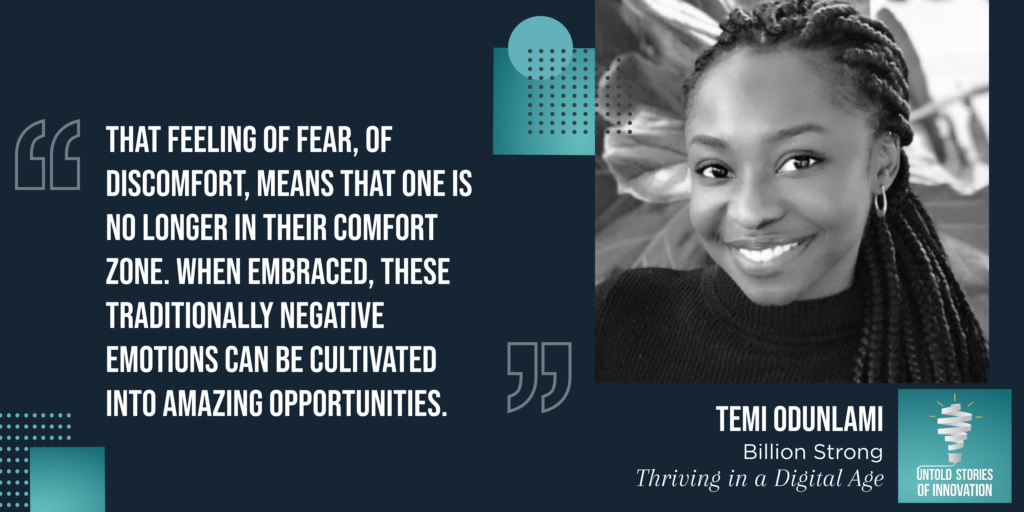
Katie Trauth Taylor: Thriving in a Digital Age [00:18:36] Something that I love about the way that you have built your organization and your strategy is you shared with me kind of in a pre-podcast call, that you have created user stories to understand the different types of people who you went to impact: the billion, if you will. Could you and the people who will mentor and partner. So can you share a little bit more about some of those stories? I was just really excited to hear that that was a major part of your strategy building.
Busayo Odunlami: Thriving in a Digital Age [00:19:07] Sure. I can give a really – a maze example. So through, you know, working in international development and just being extra liking to solve problems. I joined a group called the World Bank Group, IMF, Young African Society, and we did a conference in Abidjan. And the idea was, like I mentioned, get those hundred people together. So I’m in Ivory Coast. You know, I’m a Nigerian American. I should try and get some art to bring back home. So I go to the market in Kokodi. And while I was in Kokodi, I met Auntie Ana, who is one of our user profiles and Auntie Ana, she creates these high-end necklaces, bracelets and beaded pieces. And, you know, I notice that, you know, many of the shoppers like myself, you know, we’re getting these pieces at less than half of the market value if she was selling on Etsy or Shopify, for example, and, you know, she’s been doing this for 15 years now, some of her products, you know, they’ve definitely sold at significant premiums from the original price. But the challenge is that even when you’re selling those products at the actual real value, there are no residuals going back to her, right?
Katie Trauth Taylor: Thriving in a Digital Age [00:20:33] Exactly.
Busayo Odunlami: Thriving in a Digital Age [00:20:34] So now you have, you know, Auntie, who you know, she’s thirty nine, major breadwinner, single, and it was clear that she works with people everyday. She’s, you know, in emerging market economies, haggling is a way of life. You know, that’s how you buy things. If you’re not haggling, you’re not buying anything. So, you know, she could be selling her products on the web and guarding the real market value for her work. Now for us, we look at a perfect world where Auntie has gone through the Billion Strong three plus X framework. And in her case, the emphasis is going to be on the digital and the business skills, because every day she has social skills which they can translate relatively easy with light brush-up on some competencies on just taking those same offline face to face and replicating, you know, replicating those skills online. Now for Auntie. We just wanted a situation where at the end of our framework, Auntie would have an Instagram, a store on Etsy and Shopify. And because she’d be taking, you know, the business skills component, which part of that is, you know, marketing and business fundamentals, she would be able to actually use the web to source out the materials, and make sure that the price she’s paying for the materials for products in Ivory Coast. You know, it’s actually the best price, you know. And in this way, she actually has some sort of economic empowerment.
Temi Odunlami: Thriving in a Digital Age [00:22:07] And something she can pick up on the social skills, even though her social skills, you know, she’s working in the market. She has family. One thing you can pick up is, you know, learning that there are certain people that will not purchase animal products. So if she’s creating beads out of maybe animal bones or egg shells, those won’t sell well. But if she switches and starts selling beads made of recycled plastic and glass, there is a huge market of people who will see that as environmentally-friendly. She’ll win favor with people who are, you know, pro animals, and that just helps her increase her market share instantly without really much effort. But those are things that she may not have known, you know, just in her regular day-to-day life. So it’s little things like that that really help people brush up and pull themselves up from others.
Busayo Odunlami: Thriving in a Digital Age [00:22:55] And the one thing I do want to add, actually, is at the end of the day, our mission is self economic empowerment for people who, like Auntie Ana, and some of the user profiles that we’re working with – and I definitely am excited for the next example, which is a COVID example, but it’s for them to be able to have access to all this material and a framework that helps them leverage their skills and build more skills to actually be in the global marketplace. Right. They’re are definitely other challenges that we’ve, you know, we’ve mentioned in terms of the delivery and the last mile digital access, that hopefully with some of our pipeline partnerships with government and development entities, we can kind of fill that gap. But at the end of the day, it’s really more about Auntie goes to a scenario where she’s the sole breadwinner. And now because of looking at the framework in a way to actually help her be an entrepreneur, she can get the true market value for her products. So she’s not just someone who’s in poverty, but someone who can leverage her skills to build a pipeline of other people that she can build up. Because, you know, she’s just one of maybe four or five vendors I interacted with that had these business skills already and are existing in the marketplace that were digital depiction of what they’re doing day to day. They definitely would be in the top 25 of the Amazon sellers.
Katie Trauth Taylor: Thriving in a Digital Age [00:24:30] Exactly. What’s so incredible to me about the use story, the user stories, and especially that one about Auntie is it’s clear that there is the ability to empower and to name someone an innovator and give them those skills and let them run with those skills. And so, you know, this kind of mentorship and this kind of approach doesn’t have to. It’s really an education-based approach. It’s beautiful. It makes so much sense. Can you tell us about the COVID user story as well?
Temi Odunlami: Thriving in a Digital Age [00:25:05] Definitely. And this one touches my heart because there are so many people who have jobs and they are now deemed non-essential. I feel like that’s such an insult. Like, how can you call somebody non-essential? So, you know, it’s really about people who are victims of COVID and how we can turn their careers around and just pad them up again where there are gaps. So we have a user case of a New York creative who works in Michelin restaurants. So she’s a cook, but she also does digital art on the side. You know, in college, she’d studied fine art. So she’s really great with pen and paper and paintings. Anything you need to advertise your company and create a logo. She works in the restaurant just to pay some bills. So now the restaurant’s shut down, but she can still work online and can she can still produce her art. So she comes to us and she takes her assessment. We realize that she would need a little bit more of the business skills, and that’s where we’ll help her out as far as showing her how to promote, how to market, how to network and how to get her art out there, picking exactly which type of industry she would like to do digital advertising for. And just getting those connections set up so that really would be one of the user cases there. Just helping people who have some of the skills already and just brushing them up and propelling them to continue working digitally.
Busayo Odunlami: Thriving in a Digital Age [00:26:30] Yeah, I mean, so there’s the other thing, too, that I can add to that awesome example is, you know, it’s. Again, I’m a native New Yorker, so I can understand, and I have friends who are like this, it’s like, you know, you’re working at these super nice restaurants and it really allows you to live through your art, but also pay your bills and have the flexibility and having that go, just like some of my clients at work, to zero means that it’s a drastic shift. So, you know, I need to upscale quickly so that I can leverage these digital art skills for whoever is willing to pay me. And in a situation like that user profile, when you go through the framework, during the business skills component, there’s that market research and really, you know, knowing your customer and knowing that and then in going through that, you know, upscale, the perfect world. Right. We would want them to see that, hey, there are emerging markets, startups that haven’t been hit as bad with COVID like we have here in the States, that’ll pay me for my work. It’s digital. You know, I just need to establish some sort of a home [unclear wording] to engage with them. There are a hundred thousand million, exaggerating here, tools that can enable, you know, that communication. But that’s sort of where we’re trying to get to, at least with this user profile. And, you know, from speaking with some of my colleagues, there are other use cases that are coming into it, and that’s in the creative industry. Right. So you think about hairstylists. I’m working at the salon and my salon might not be open, so I need to maybe start doing some home appointments. How do I let my customers know that I’m safe and I’m getting tested weekly or cetera? Right. So there’s a huge shift that has to happen in the interim. Right. Because we look at sort of the safety net, at least here at our society in the States, a lot of those are ending. So people have to start thinking about how am I going to get supplemental income?
Katie Trauth Taylor: Thriving in a Digital Age [00:28:32] Yeah, absolutely. This is why I think your three-prong approach makes so much sense. You’re not just thinking about digital, you know, education, and comfort and confidence, with certain digital tools. You’re talking about business skills as well as social skills and helping each user kind of come in and determine which areas will most help me transform my skills, my talents, my interests, my experiences into a new thing or the next step for me.
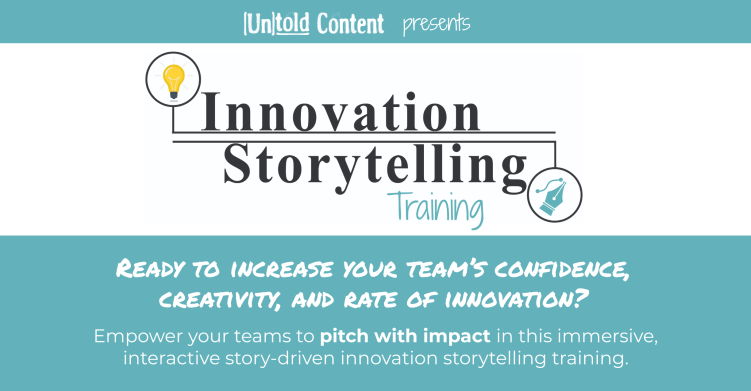
Temi Odunlami: Thriving in a Digital Age [00:29:01] Yes.
Busayo Odunlami: Thriving in a Digital Age [00:29:03] Thank you. Yeah. I totally agree.
Katie Trauth Taylor: Thriving in a Digital Age [00:29:04] When we first connected. I started thinking a lot about the different communities that I’ve worked with over the years. And, you know, a lot of the work that I do now as the CEO of Untold is with, you know, innovation leaders or clinical and tech experts and that sort of thing. But so much of my background is in community-based literacy. And that still, I think, shines in some of the consumer research and the research that we do at Untold and some of the qualitative research, oral history work that we do. But I was thinking a lot about the the work that I did in Appalachian communities and urban Appalachians and Afrolachian communities and Hispanic communities in downtown Cincinnati and across cities in the Midwest. And it’s interesting how culturally or from a socioeconomic standpoint, there are social skills that operate within certain communities that work to help people thrive in those communities. And they are an art form in and of itself. And they, it’s something that maybe won’t be taught in an Ivy League college classroom. Right. But in that social environment, in that economic environment, it is a skill and coming in with a deep respect for that and an understanding that someone who can learn that and adapt to different environments will be able to take on all kinds of other skills, because it’s just I think it’s what I’m trying to say is the value and the deeply inherent value in making sure that whenever we’re coming in to provide upscaling, that we’re thinking about the people and we’re never coming at it from a perspective of arrogance, I guess, is my thought. Yeah, and that’s what I respect and love so much about what you’re doing is, you seem to be really deeply mindful of the skills that are already present in the people who will be benefited by Billion Strong. And you’re coming at it from a perspective of elevating those people and and building their confidence rather than saying, you know, or you don’t have.. Coming at it from a point of lack. Does that make sense?
Temi Odunlami: Thriving in a Digital Age [00:31:27] Oh yeah, definitely. And empathy is one of our drivers. We really feel like empathy is above everything. Empathy is an important thing to have when you are feeling what other people are feeling when you can walk a mile in their shoes and you know exactly that impact. It helps breed love and hope and peace. When everybody is able to sit at the table. There is equity. There’s equality. It helps eliminate hatred, bigotry, racism, all the problems that we’re facing right now. Empathy is to me, it’s the antidote. And we need to bring that out more. And so we want people as they come through us to leave with that sense of love for others. And as they come through us in the upscale, they’re now equipped with, you know, weapons of love. Weapons to go change the world and to innovate further. So that’s really what we want people to do, come to us, learn these skills, but then take it a step further and change the world, too.
Katie Trauth Taylor: Thriving in a Digital Age [00:32:28] I love that so much. Could you share, as we wrap up, some advice that you’d like to provide to people who are maybe nervous to learn new skills or who are worried about, you know, the ways in which they can be innovative now, especially if their lives have been or their careers have been impacted by the pandemic?
Busayo Odunlami: Thriving in a Digital Age [00:32:49] Well, being scared is good. Right? So I think that part is…
Temi Odunlami: Thriving in a Digital Age [00:32:56] Also, why is being scared good?
Busayo Odunlami: Thriving in a Digital Age [00:32:58] Well, I think, you know, being scared is sort of, you know, when you’re about to challenge yourself as a human, you get that feeling. Right? So it’s… Even in the most confident moment before a performance, you still get that sort of shivers. Right. So I think the act of being scared is exactly the kind of individual that we want, because at the end of the day, we’re looking – we acknowledge the human part of our existence. And that means that there’s some people who just don’t want to do anything. And either go to, say, society. Some people would say that’s where a universal basic income comes into play, I guess. But for our mission, we’re looking at individuals who are super-charged and these are individuals who actually want to and don’t have access. So if we can take the billion people who would want to do that, we’re a lot better placed than we are right now, because there are, you know, with my working youth there, I’ve met at least 10 to 20 thousand youth who are exactly in need of these frameworks and these systems that like from all over the world who are really yearning to sort of create their self economic empowerment.
Temi Odunlami: Thriving in a Digital Age [00:34:20] To add to that, I would say, you know, that feeling… that feeling you described would be the discomfort and that’s you stepping out of your comfort zone. So I would just advise people to embrace that. It’s never too late to learn. There is no such thing as being too old because the brain is powerful and this is your chance. Especially if you’re sitting at home and you know you’re in quarantine or you just don’t have anything to do, if you could spend a week with some tools online, you could create something so amazing. So we want people to join us and come into that and learn something new that will change their life and change others lives, too. And being afraid is good, because once you conquer fear, you can do anything.
Busayo Odunlami: Thriving in a Digital Age [00:34:59] And, you know, actually Temi, I have a great example.
Temi Odunlami: Thriving in a Digital Age [00:35:03] Oh, yeah?
Busayo Odunlami: Thriving in a Digital Age [00:35:04] A real life America example. So I spent some time in between gigs at my parents place. And when I got there, I had a BlackBerry [unclear wording] like super just like all over the place. And I was a microbiologist. I was like, “mom, calm down, blah,blah, blah.” We got her an iPhone, her emoji game? It’s ridiculous. So, you know, I think it’s really more of just a comfort level and having a frame of reference to be able to align with the different stakeholder groups. Right. And that’s how we can start to get more of our adult population. Especially those who are working in the, sort of, the nursing homes, you know, I’ve got some colleagues who are doing some work [unclear wording] with some products in nursing homes and really getting them also comfortable with technology, because we also have to realize that there is ageism out there and we need to stop with that and make sure we’re also creating products. Right. That’s what we talk about, our frame of reference with self-awareness and empathy. And make sure as we’re creating these products, we’re thinking about the full spectrum of our stakeholders. And we, you know, we’re always looking to definitely get more people involved in building our tech, so… Thank you so much, we really appreciate it.
Temi Odunlami: Thriving in a Digital Age [00:36:27] Thank you for your time. Thank you for listening.
Katie Trauth Taylor: Thriving in a Digital Age [00:36:30] Oh, thank you so much for sharing Billion Strong with all of our listeners and for sharing your user stories. I know that we were all inspired by this. And on a personal level, but also, of course, from a business perspective, if people want to get involved and learn more, how can they reach out?
Temi Odunlami: Thriving in a Digital Age [00:36:50] Yes, please visit us at a billionstrong.me. That’s Billion Strong, Dot M. E.
Katie Trauth Taylor: Thriving in a Digital Age [00:36:58] Perfect. Temi and Busayo, thank you so much. It’s been such an energizing conversation. I can’t wait to learn more about how I can get involved personally. And I’m really excited to hear more innovation stories come out of your work.
Busayo Odunlami: Thriving in a Digital Age [00:37:11] Thank you.
Temi Odunlami: Thriving in a Digital Age [00:37:12] Thank you so much. This was great.
Katie Trauth Taylor: Thriving in a Digital Age [00:37:16] Thanks for listening to this week’s episode. Be sure to follow us on social media and add your voice to the conversation. You can find us @untoldcontent.
You can listen to more episodes of Untold Stories of Innovation Podcast.
*Interviews are not endorsements of individuals or businesses.
